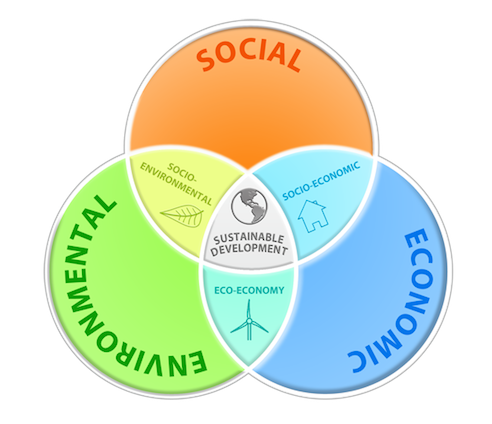Write city council today at cityleaders@fcgov.com and ask them to support the full Cityplan (see bottom for suggested language)
The City of Fort Collins is guided by a principle called the “triple bottom line.” TBL is a balancing and integration of social, environmental, and economic health and sustainability. It’s a powerful way of looking at community health and values and has a number of implications. In particular, it is designed to foster innovative cross-sector partnerships to help tackle complex challenges. I love TBL as a framework because active transportation advocacy sits comfortably at the center of all of those overlapping interests.
It also serves as a reminder of how interconnected our social, environmental, and economic health are. Our businesses need a healthy workforce and consumers to grow and thrive. At the same time, our growth has to be well-planned and inclusive to minimize congestion, pollution, workforce and talent flight, and increased social segregation.
Its easy to be complacent in Fort Collins when so many quality of life measures are strong and healthy. We’re a platinum bike-friendly community and regularly make the short list of great places to live, go to college, start a new business, and raise a family. This complacency might go a long way towards answering the puzzling question of why-only months after the 2016 presidential election, amid a dramatic burst of activism and civic engagement around the country-our recent city council election turnout was the lowest in 20 years.
But complacency is dangerous, and growth and prosperity breed a tension between who we have always been and where our current policies and planning are steering us.
If you believe, like most Fort Collins residents, that congestion, lack of affordability, pollution, and sprawl are pressing threats, complacency should cause you concern. If you believe in building a safe community for kids to roam and grow up, and for seniors to stay active and engaged as they age, complacency is a profound danger. If you believe that working families should be able to live and play in the city their labor supports, complacency is an anchor and the time for action is now. And that action can begin by asking our city council to fully commit to Cityplan.
Fort Collins’ planning department is among the best anywhere (of note: the Colorado Chapter of the American Planning Association has recently selected the Fort Collins Downtown Plan as a recipient of the 2017 APA Colorado Honor Award). They encompass a spectrum of values and experience as diverse as the city itself, from folks who’ve been here for years and know every curb cut and stormwater retention basin from memory, to young professionals attuned to emerging ideas and best practices for urban sustainability.
Last fall, during the city budget process, these committed planners proposed a visionary and ambitious update to our city plan. This plan would be different from previous plans in a few important ways: first, it would integrate our city master plan, transportation plan, and transit plan updates into one process. This would provide a better result and provide for a robust conversation about the relationships among those individual elements. It was also intended to include a greatly increased commitment to equity, inclusion, and community health and wellness. “Cityplan” was approved as part of the 2017-2018 budget, RFPs were sent, contracts were prepared.
Things hit a snag at a council work session in May, when city staff presented the proposed plan to council and a number of questions arose. Specific concerns vary depending on who you ask, but they include a sense from council members that the proposed update reinvents the wheel, shoehorns in initiatives that are outside the appropriate scope of a city plan process, or simply that the existing plan is working and the current proposal is overkill.
The future of the plan as originally conceived was cast into doubt and talk began of reductions in scale on the order of 35-40 percent. By some accounts, the reduction in scope is likely to trim the plan to a nuts-and-bolts land use and transportation policy guide. It will almost certainly require walking back prioritization of equity and inclusion (the challenging, time consuming, but critical work of engaging historically marginalized populations in planning processes that have such a profound impact on their access to health and opportunity.)
It should be clear to anyone in Fort Collins that we’re rapidly changing. Some of our challenges are conventional growing pains associated with the transition from a big town to a small city. But we also face tough questions about the future of energy and transportation technology. Our stubborn commitment to an unsustainable transportation status quo belies a lack of genuine resolve in tackling our climate action goals. And socially, we face an urgent, time-sensitive need for thoughtful consideration of how to integrate long neglected neighborhoods into our regional prosperity without driving out long-time residents.
Fort Collins is still in a tentative and precarious phase of adopting a true triple bottom line vision of community sustainability. How do we “bake in” inclusion and equity (a word that does not appear in the last iteration of city plan from 2011)? How do we measure and internalize them with shared language, metrics, and concrete policies, like we have for economic health and climate action plan?
Our city plan isn’t simply about surveys and prescriptions. It’s a community-wide conversation–a dialogue about how to align our policies and budgets with our long-term vision. It’s an opportunity for leaders and planners to learn about and inform community values. It’s a conversation about what what kind of Fort Collins our children will inherit, a conversation that has not always engaged all voices equally. It’s a manifesto for how we grow and who is welcome here. And this update is a timely response to the constellation of challenges on the horizon. It asks, “How do we get there from here?”
Fort Collins faces growth challenges that are formidable. But we also have a city council that is engaged, accessible, and responsive. We have planners and staff who are dedicated and capable. And we have a proposal on the table for a plan update that is the ambitious, comprehensive process that our children need and deserve.
No one, least of all Bike Fort Collins, presumes to have all the answers to affordability, sustainable living wages, displacement, and fostering inclusive and representative leadership. But if the City of Fort Collins began to take the same pride in social entrepreneurship and innovation that it takes in green tech, we could be a national pioneer, and make huge strides in resilience. We are a big enough city that these challenges have real consequences for thousands of people, but small enough that–with courage–we can change course more nimbly than a massive urban center.
There is no more urgent priority for Fort Collins in 2017 than robust and inclusive long-term planning that manifests our triple bottom line commitment to sustainability. With that in mind, Bike Fort Collins invites our partners and supporters to join us in asking our city leaders (cityleaders@fcgov.com) to reconsider scaling back the plan update, and honor the hard work and expertise that have served us so well for so long. Let’s have a community-wide conversation about where we’re headed, and make sure everyone is invited and heard.
write cityleaders@fcgov.com
Dear City Leaders,
With congestion, pollution, growth, affordability, and sprawl looming on the horizon as long term challenges to keeping Fort Collins great. I urge you to invest in the full Cityplan proposal. Cityplan is not just about buildings and codes. It is a manifesto for our values and an opportunity for a community wide conversation about our identity and long term vision.
Our city planners are outstanding professionals, with a deep understanding of our past and the necessary vision to help us built a resilient future.
“Cities have the capability of providing something for everybody, only because, and only when, they are created by everybody.” – Jane Jacobs
Signed,
(name)


